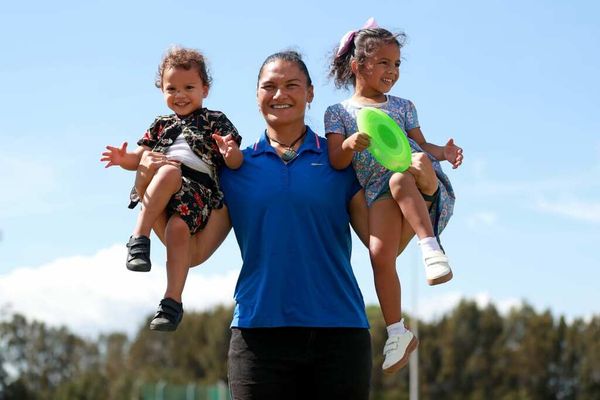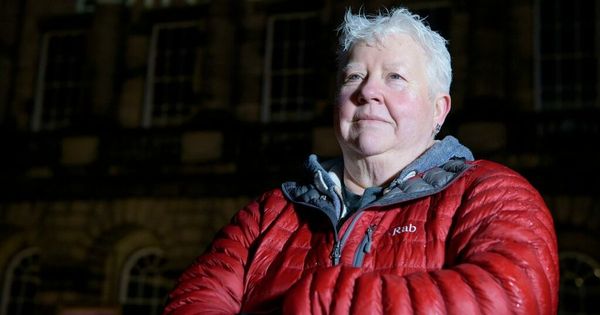
Val Robinson, who has died aged 80, was one of Britain’s best hockey players, appearing 149 times for England and 21 times for Great Britain over more than two decades from 1963 to 1984.
During that period she was better known than anyone else in her sport – male or female – and added to her fame when she twice won the BBC’s Superstars competition, in 1979 and 1981, by roundly defeating strong fields of much younger elite athletes.
Fairly small at 5ft 5in and weighing 9st, but supremely fit and tough, Robinson was a midfielder with attacking intent whose main aim was to serve up scoring opportunities for her teammates by dribbling through the opposition.
Devastatingly quick, with a trademark body swerve and the ability to keep the ball glued to her stick even on bumpy surfaces, she played with her head up, on the lookout for the killer pass or an opening that would allow her to essay a mazy run.
For much of her career the England women’s hockey team had an annual televised fixture at Wembley Stadium, often attended by 60,000 or more fans, many of them schoolgirls on what the Guardian’s hockey correspondent, Nancy Tomkins, characterised as “a combination of pilgrimage and jamboree”. Each year for two decades Robinson was their idol, heralded by a crescendo of screams every time she set off on one of her marauding adventures.
The first woman to play 100 times for England, her final tally of appearances was a record at the time, and given that she played in an era when internationals were much less frequent, is probably equivalent to, or maybe even better, than the 375 England caps attained more recently by Kate Richardson-Walsh.
Robinson’s participation in Superstars – which attracted millions of viewers in its heyday – did as much if not more to raise her profile as her exploits on the hockey field. She was in her late 30s when she featured in the 1979 event, and on account of her age was largely overlooked as a serious contender.

However, she came out such a convincing winner that she was omitted from the following year’s competition because the BBC felt she had taken some of the excitement out of the show. Reinvited in 1981, by which time she was 40, she won just as comfortably at her second attempt.
Still intimidatingly fit, Robinson continued to play hockey at international level for three more years, and was able to remain competing at the highest club level into her 50s, before retiring to concentrate on running a hockey training centre.
Born in Accrington, Lancashire, to Doris (nee Kay), a cotton-mill weaver, and Bill Walsh, a polisher, she first played hockey aged 14 at Accrington high school for girls, by which time she was already a notable all-round athlete. Her first interest was in football, playing for Accrington Ladies as a teenager and joining Preston Ladies in 1959, where she caught the eye of the Manchester United manager Matt Busby, who declared her the best female footballer he had ever seen.
In 1961 she went to train as a PE teacher at Chelsea College of Physical Education in Eastbourne, and by the following year had decided to concentrate on hockey. She won her first England cap in 1963, and taught PE in Ellesmere Port in Cheshire before marrying fellow teacher Gwyn Robinson in 1965, moving south with him to Bedfordshire, where she became head of girls’ PE at Stratton school in Biggleswade and played for the Parkside Ladies club in Bedford over the next 15 years.
After initially struggling to establish herself in the England side, Robinson became a constant presence from 1965 onwards, missing only one of the big Wembley matches between 1966 and 1984. She helped England to victory in the 1975 World Championship in Edinburgh, and in 1978 was called up to the newly created Great Britain team, which was targeting participation in the 1980 Olympics in Moscow – women’s hockey having been included in the Games for the first time. In the event, however, her team withdrew in support of a US-led boycott against the Soviet Union, and her only realistic chance of featuring in an Olympics had gone.
By then Robinson’s profile had been raised considerably through her 1979 appearance in Superstars, in which she won five out of the six events designed to test all-round sporting prowess. Her 1981 win was all the more remarkable not just because of her relatively advanced age, but because she had been laid low just before the event after an industrial accident near her home had exposed her to a cloud of poisonous gas. Unable to eat for three days, even in her weakened state she was able to romp away with the trophy for a second time.
Robinson celebrated both victories with her customary post-match beer and cigarette, having sustained a smoking habit for many years without any noticeable impact on her natural fitness, apart from a “nasty cough in the morning”, although she did quit soon after the poisoning incident.
Her international hockey career ended in 1984,and the following year she was appointed OBE. But her club hockey went on until 1998, playing to a high standard well into her 50s for Great Harwood/Blackburn Northern, where she proved, as always, to be a dedicated club member.
She and Gwyn had built their own house in the village of Guilden Morden in Cambridgeshire in the 1960s, using self-help books. But in the early 80s they gave up teaching and moved back north to set up a residential hockey centre at Foxhill Bank House in Accrington, where Val ran coaching courses for school, club and county teams, and Gwyn looked after the catering and hospitality.
Gwyn died in 2020.
• Valerie Robinson, hockey player, born 18 December 1941; died 13 February 2022










